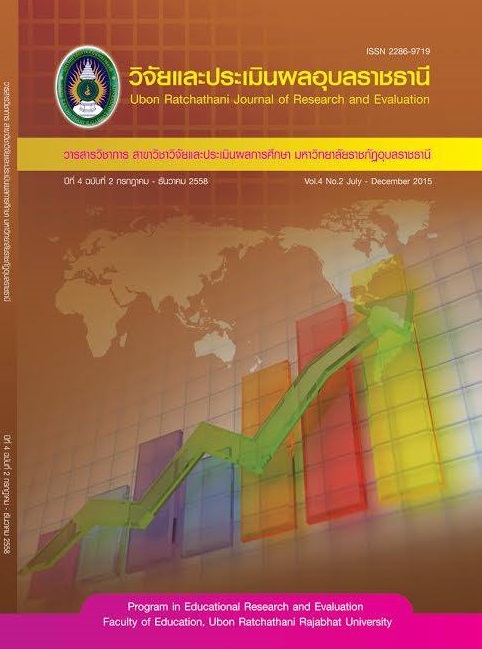การปฏิบัติการพัฒนาทักษะการอ่านคำควบกล้ำโดยใช้เกมการเรียนรู้แบบมีส่วนร่วม สำหรับนักเรียนชั้นประถมศึกษาปีที่ 5 กลุ่มส่งเสริมประสิทธิภาพการศึกษามหาธาตุ สังกัดสำนักงานเขตพื้นที่การศึกษาประถมศึกษาอุบลราชธานี เขต 4 72-81
คำสำคัญ:
การวิจัยปฏิบัติการ ทักษะการอ่านคำควบกล้ำ เกมการเรียนรู้แบบมีส่วนร่วมบทคัดย่อ
การวิจัยและพัฒนาครั้งนี้มีวัตถุประสงค์ 1) เพื่อพัฒนาผลการปฏิบัติการพัฒนาทักษะการอ่านคำควบกล้ำ
โดยใช้เกมการเรียนรู้แบบมีส่วนร่วม 2) เพื่อเปรียบเทียบผลการพัฒนาทักษะการอ่านคำควบกล้ำของนักเรียนหลังปฏิบัติการสอนกับเกณฑ์ปกติ 3) เพื่อเปรียบเทียบผลการพัฒนาทักษะการอ่านคำควบกล้ำของนักเรียนกลุ่มทดลองกับกลุ่มควบคุม และ 4) เพื่อวัดเจตคติของนักเรียนที่มีต่อการใช้เกมการเรียนรู้แบบมีส่วนร่วม ตัวอย่างที่ใช้ในการวิจัยครั้งนี้ คือ นักเรียนชั้นประถมศึกษาปีที่ 5 จำนวน 10 คน แยกเป็นกลุ่มทดลองนักเรียนโรงเรียนบ้านบัววัด จำนวน
5 คน และกลุ่มควบคุมนักเรียนโรงเรียนบ้านหนองสองห้อง จำนวน 10 คน ซึ่งได้มาจากการเลือกแบบเจาะจง เครื่องมือที่ใช้ในการวิจัย คือ แผนการจัดการเรียนรู้ แบบวัดผลสัมฤทธิ์ทางการเรียน แบบวัดเจตคติ สถิติที่ใช้ในการวิจัยคือ ร้อยละ ค่าเฉลี่ยและส่วนเบี่ยงเบนมาตรฐาน และทดสอบสมมติฐานการวิจัยด้วยสถิติ แมนวิทนีย์ ยู
ผลการวิจัยพบว่า
- การศึกษาผลการปฏิบัติการอ่านคำควบกล้ำ ครั้งนี้ใช้วิธีสอนโดยใช้เกมการเรียนรู้แบบมีส่วนร่วม
- การศึกษาผลการปฏิบัติการเมื่อเทียบกับเกณฑ์ พบว่า นักเรียนมีคะแนนหลังเรียนเฉลี่ยทั้ง 3 วงจร คิดเป็นร้อยละ 80.70 และมีนักเรียนร้อยละ 100 ผ่านเกณฑ์ที่กำหนดไว้ที่ร้อยละ 100
- การเปรียบเทียบผลการพัฒนาทักษะการอ่านคำควบกล้ำ พบว่า นักเรียนในกลุ่มทดลองมีทักษะการอ่านคำควบกล้ำสูงกว่ากลุ่มควบคุม อย่างมีนัยสำคัญทางสถิติที่ระดับ .05
- 4. ผลการวัดเจตคติ พบว่า เจตคติของนักเรียนอยู่ในระดับดี มีค่าเฉลี่ยเท่ากับ43
เอกสารอ้างอิง
กฤษณา กิตติเสรีบุตร. การพัฒนาทักษะการอ่านออกเสียงคำควบกลํ้า ร ล ว ของนักเรียนชั้น ประถมศึกษาปีที่ 3 โดยใช้หนังสือส่งเสริมทักษะการอ่านออกสียง. วิทยานิพนธ์ครุศาสตรมหาบัณฑิต มหาวิทยาลัยราชภัฏมหาสารคาม, 2553.
กาญจนา โพธิลักษณ์. การใช้เกมเสริมทักษะการอ่านคำที่มีตัวสะกดสำหรับนักเรียนชั้นประถมศึกษาปีที่ 1 โรงเรียนเทศบาลวัดศรีปิงเมือง. วิทยานิพนธ์ครุศาสตรมหาบัณฑิต มหาวิทยาลัยราชภัฏเชียงใหม่, 2554.
คัชรินทร์ พิกุลงาม. การใช้เพลงเพื่อพัฒนาการอ่านออกเสียงคำที่มีพยัญชนะ ร ล ว ควบกล้ำ ของนักเรียน ชาวเขาชั้นประถมศึกษาปีที่ 2. วิทยานิพนธ์ครุศาสตรมหาบัณฑิต มหาวิทยาลัยราชภัฏเชียงใหม่, 2549.
วิภาวี ใจยะวัง. การพัฒนาสื่อประสมเพื่อรณรงค์การเล่นเกมคอมพิวเตอร์อย่างสร้างสรรค์ของนักเรียน ชั้นมัธยมศึกษาตอนต้น : กรณีศึกษานักเรียนในจังหวัดเชียงใหม่. วิทยานิพนธ์ศึกษาศาสตรมหาบัณฑิต มหาวิทยาลัยเชียงใหม่, 2550.
ศรัญญา ผาเบ้า. ผลการใช้เกมคอมพิวเตอร์เป็นสื่อเสริม วิชาวิทยาศาสตร์สำหรับนักเรียนช่วงชั้นที่ 2 ที่มีระดับผลสัมฤทธิ์ทางการเรียนทางวิทยาศาสตร์ต่างกัน. ปริญญานิพนธ์การศึกษามหาบัณฑิต มหาวิทยาลัย
ศรีนครินทรวิโรฒ, 2551.
ศึกษาธิการ, กระทรวง. การปฏิรูปการศึกษาในทศวรรษที่สอง (พ.ศ. 2552-2561). กรุงเทพฯ: สำนักงานเลขาธิการสภาการศึกษา, 2552.
สรัสวดี ภู่กร. การใช้เกมเพื่อสร้างแรงจูงใจในการจัดกิจกรรมการเรียนการสอนวิทยาศาสตร์ ชั้นมัธยมศึกษาปีที่ 2 เรื่อง ระบบโครงกระดูกและกล้ามเนื้อ. ปริญญานิพนธ์การศึกษามหาบัณฑิต มหาวิทยาลัยศรีนครินทรวิโรฒ, 2555.
สุภาพ ไชยช่อฟ้า. การใช้เกมฝึกการชุดเพื่อการสื่อสารสำหรับเด็กปฐมวัย. วิทยานิพนธ์ครุศาสตรมหาบัณฑิต มหาวิทยาลัยราชภัฏมหาสารคาม, 2554.
เสงี่ยม เวียงคา. การพัฒนาทักษะการเขียนสะกดคายาก ของนักเรียนชั้นประถมศึกษาปีที่ 2 โดยใช้เกม. วิทยานิพนธ์ศึกษาศาสตรมหาบัณฑิต มหาวิทยาลัยเชียงใหม่, 2550.
Tuzun, HaKan and others. “The Effects of Computer Games on Primary School Students’ Achievement and Motivation in Geography Learning,” Computer & Education. 52,1 (January 2009): 68-77.
ดาวน์โหลด
เผยแพร่แล้ว
รูปแบบการอ้างอิง
ฉบับ
ประเภทบทความ
สัญญาอนุญาต
1. บทความที่ตีพิมพ์ในวารสารนี้ได้มีการตรวจสอบการลอกเลียนงานวรรณกรรมแล้ว ไม่เกินร้อยละ 25
2. บทความที่ตีพิมพ์ในวารสารนี้เป็นข้อคิดเห็น ข้อค้นพบของผู้เขียนบทความ โดยผู้เขียนบทความต้องเป็นผู้รับผิดชอบต่อผลทางกฎหมายใด ๆ ที่อาจเกิดขึ้นจากบทความนั้น ๆ
3. บทความ ข้อมูล เนื้อหา รูปภาพ ฯลฯ ที่ได้รับการตีพิมพ์ในวารสารวิจัยและประเมินผลอุบลราชธานี ถือเป็นลิขสิทธิ์ของวารสารวิจัยและประเมินผลอุบลราชธานี หากบุคคลหรือหน่วยงานใดต้องการนำทั้งหมดไปเผยแพร่ต่อหรือเพื่อกระทำการใดๆ จะต้องได้รับอนุญาตเป็นลายลักษณ์อักษรจากวารสารวิจัยและประเมินผลอุบลราชธานีก่อนเท่านั้น และจะต้องมีการอ้างอิงวารสารวิจัยและประเมินผลอุบลราชธานี ฉบับนั้น ๆ ด้วย






